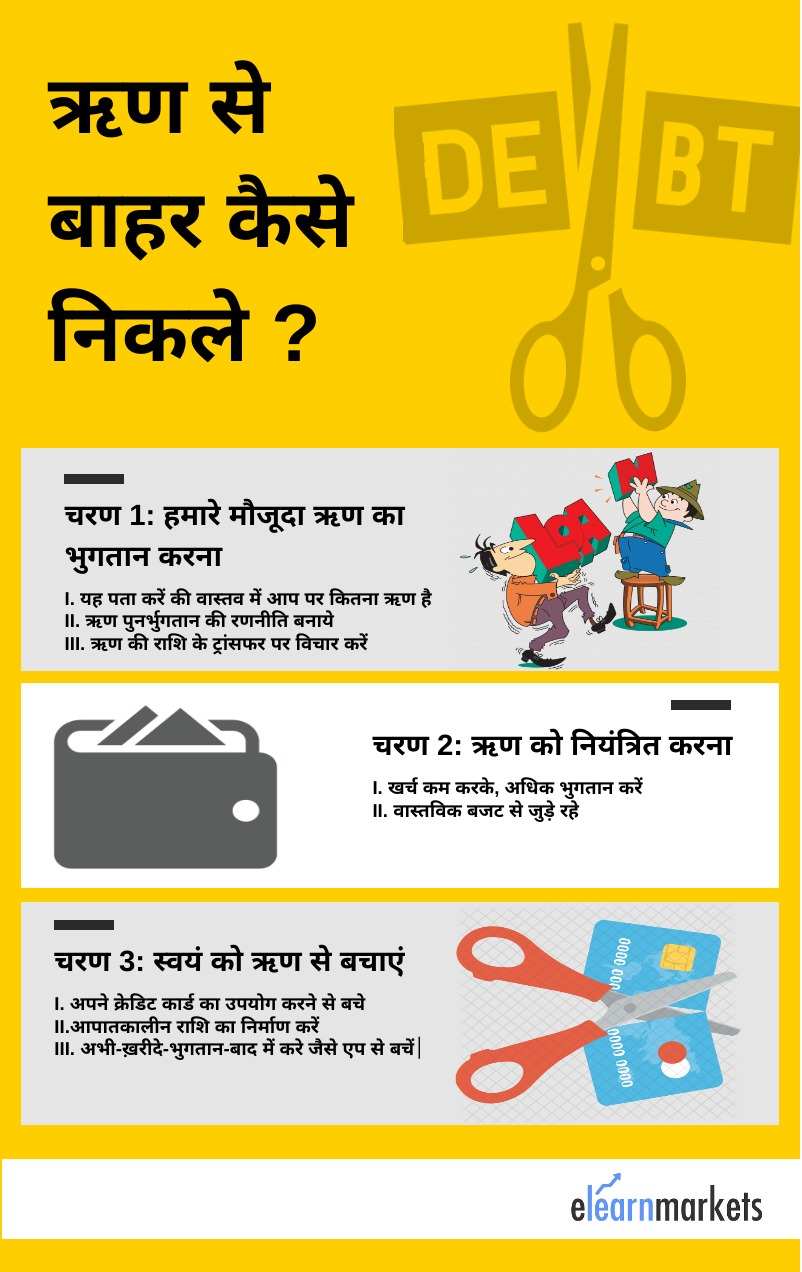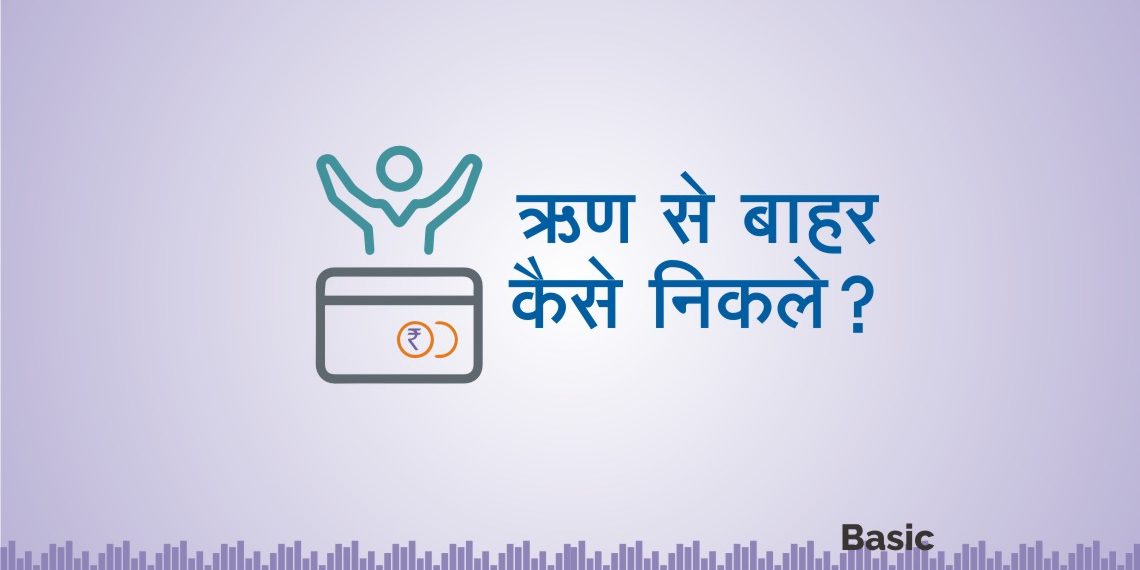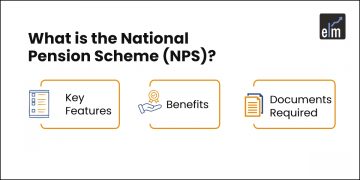English: Click here to read this article in English.
- हम ऋण प्रबंधन को तीन-चरण, विस्तृत योजना के रूप में देख सकते है׀
- ऐसी बहुत सी विभिन्न रणनीतियाँ है जिनका उपयोग हम ऋण का भुगतान करने के लिए कर सकते है, जैसे ऋण स्नोबॉलिंग विधि׀
- ऋण को रोकने का सबसे अच्छा तरीका यह है कि हम अपने खर्च कम करे और अपने ऋण दायित्वों के प्रति अधिक से अधिक भुगतान करें׀
- नकद में भुगतान करने जैसी विभिन्न विधियाँ हमारे ऋण को रोकने में हमारी मदद कर सकती है׀
व्यक्तिगत वित्त के प्रत्येक तत्व की तरह ही, अपने ऋण का प्रबंधन करना एक ऐसा कार्य है जिसके लिए व्यापक योजना की आवश्यकता होती है׀
| Table of Contents |
|---|
| हमारे मौजूदा ऋण का भुगतान करना |
| ऋण को नियंत्रित करना |
| स्वयं को ऋण से बचाएं |
ऋण से बाहर निकलना एक अल्पकालिक उपाय नहीं होना चाहिए, यह पूर्ण रूप से एक व्यापक योजना होनी चाहिए जो यह सुनिश्चित करे कि हम कभी भी अपने ऋण को खुद पर हावी न होने दे׀
इस व्यापक योजना में, तीन बातों पर ध्यान देने की आवश्यकता है-
- हमारे ऊपर जो ऋण है उसका भुगतान करना;
- भविष्य में अपने ऋण पर नियंत्रण रखना; और
- हम ऋण को जितना रोक सकते है रोकना׀
मार्केट एक्सपर्ट्स से फाइनेंसियल शिक्षा कार्यक्रम के साथ ऋण प्रबंधन की मूल बातें जानें
इस लेख में, हम आपका मार्गदर्शन एक योजना के माध्यम से करेंगे, जिसमें हम ऋण का भुगतान करने, उसे रोकने और खुद को ऋण से बचाने के लिए कुछ महत्वपूर्ण कदम उठा सकते है׀

ऋण प्रबंधन चरण 1: हमारे मौजूदा ऋण का भुगतान करना
I. यह पता करें की वास्तव में आप पर कितना ऋण है:
आप अपने ऋण का भुगतान करना कैसे शुरू कर पाएंगे यदि आप यह नहीं जानते की वास्तव में आप कितना भुगतान कर रहे है?
हमारे अधिकतर ऋण के पुनर्भुगतान हमारे बैंक अकाउंट से संचालित रूप से काट लिए जाते है, तो उनकी विस्तृत जानकारी रखना कठिन हो जाता है׀
इसलिए, सबसे पहले तो आपको अपने मासिक भुगतान, कुल बैलेंस और ब्याज दरों के साथ अपने सभी ऋण ऑब्लिगेशन की एक लिस्ट बनानी चाहिए।
ऐसा करने से आपको स्पष्ट रूप से यह जानकारी मिल जाएगी की आपकी ऋण की स्थिति क्या है׀ यह आपको अपने ऋण को प्रबंधित करने के लिए एक दिशा प्रदान करेगा׀
II. ऋण पुनर्भुगतान की रणनीति बनाये:
यह जानने के बाद की आपको कितना भुगतान करना है, अपनी सुविधा अनुसार एक योजना बनाये जिससे आप अपने ऋण का भुगतान कर सकें׀ यह जानने के बाद, कि आपको कितना भुगतान करना है, अपने ऋण को चुकाने की ऐसी योजना बनायें जो आपके लिए सबसे अच्छा और आसान हो।
यहाँ कई लोकप्रिय ऋण पुनर्भुगतान की रणनीतियां उपलब्ध है जिन्हें आप उपयोग कर सकते है׀ इनमे से एक है ऋण विधि׀
इस विधि की सहायता से अपने ऋण का भुगतान कैसे करें-
- अपने सभी ऋण दायित्वों में से सबसे न्यूनतम शेष राशी का भुगतान करें׀
- अपने बजट की जांच करें, और अपने ख़र्चों में कटौती करके अतिरिक्त धनराशि का निर्धारण करें׀
- इसके अतिरिक्त धन का उपयोग सबसे छोटे ऋण के लिए अधिक से अधिक भुगतान करने के लिए करें׀
छोटे ऋणों का भुगतान जल्दी करने से, हम शीघ्रता से ऋणों का निपटान कर पाने में सक्षम रहेंगे׀
यह हमारे क्रेडिट स्कोर में भी बढ़ोतरी करता है׀
III. ऋण प्रबंधन की राशि के ट्रांसफर पर विचार करें:
आसानी से ऋण भुगतान करने का एक अन्य तरीका यह है कि आप अपने ऋण की शेष राशि को उस ऋणदाता के पास ट्रांसफर करें जो ब्याज की कम दरें प्रस्तावित करता है׀
यह राशि ट्रांसफर क्रेडिट कार्ड के साथ साथ बैंक के लोन में भी उपलब्ध है׀
इससे अलावा,, हर महीने भुगतान की जाने वाली राशि पर नेगोशिएट करके, आप किश्त को छोटा भी कर सकते हैं, जिससे आपके ऋण का बोझ थोडा कम हो सकें׀
ऋण प्रबंधन चरण 2: ऋण को नियंत्रित करना
I. खर्च कम करके, अधिक भुगतान करें׀
ऋण को नियंत्रित करने का सबसे अच्छा तरीका इसे रोकना है׀
इसीलिए, अगला कदम आपके बजट को नियमित रूप से जांचना है׀
जांचने से, हमारा अर्थ यह है कि आपको समय-समय पर अपने बजट का निरीक्षण करना चाहिए और फिर जिन अनावश्यक खर्चों में आप कटौती कर सकते है उनमें कटौती करनी चाहिए׀
अपने खर्चों में कटौती करके आपने जो धन बचाया है इसका उपयोग आपके ऋणों में न्यूनतम भुगतान से अधिक राशी का भुगतान करके किया जा सकता है׀
इसीलिए, आप खर्चों को कम करके और अधिक भुगतान करके आप ऋण को चुकाना और ऋण प्रबंधन को नियंत्रित करने के दो उद्देश्यों को प्राप्त कर सकते है׀
II. वास्तविक बजट से जुड़े रहे:
एक ऐसा बजट जिसके बारे में अच्छे से समझा जा सके, और जो फ्लेक्सिबल (लचीला) भी हो।
एक अच्छा लचीला बजट बनाने का शानदार तरीका यह है कि 50/30/20 नियम जैसे थंब रूल को लागू करके अपनी आवश्यकतानुसार उसमे संशोधन करें׀
बेशक, जैसा की हमने पहले भी उल्लेख किया है, हमेशा अपने बजट का समय समय पर समीक्षा निरीक्षण करना याद रखें और यह सुनिश्चित करें की यह आपकी सभी आवश्यकताओं के अनुरूप है या नहीं और आपकी सभी जरूरतों को बिना प्रतिबंधित किये पूरा कर रहा है, और आपको सीमाओं में नहीं बांध रहा है जिसका संभवतः अनुसरण आप नहीं कर सकते׀
ऋण प्रबंधन चरण 3: स्वयं को ऋण से बचाएं
I. अपने क्रेडिट कार्ड का उपयोग करने से बचे:
हमें अपने क्रेडिट कार्ड का उपयोग क्यों नहीं करना चाहिए इसके बहुत से कारण है, परन्तु इसका मुख्य कारण है कि यह हमारे ऋण को नियंत्रण से बाहर घुमने की अनुमति देता है׀
क्रेडिट कार्ड का उपयोग करके किसी भी वस्तु को खरीदना सबसे आसान तरीका है, परन्तु यह उच्च-ब्याज ऋण प्रबंधन उत्पन्न करता है जिसका प्रबंध करना कठिन हो जाता है׀
जब तक कोई अत्यावश्यक कार्य न हो तब तक क्रेडिट कार्ड का उपयोग करने से बचे, और नगद खरीदी की ओर जाएँ׀ ऐसा करने से आपके ऋण उत्पन्न करने की गति में कमी आएगी, और इससे आपके क्रेडिट स्कोर में भी सुधार आएगा׀
II. ऋण प्रबंधन के लिए आपातकालीन राशि का निर्माण करें:
हम इस बात पर ज़ोर नहीं दे सकते कि आपातकाल राशी कितनी महत्वपूर्ण है, ख़ास तौर पर जब ऋण चुकाना मुश्किल हो जाता है׀
यह एक नौकरी की हानि, या अचानक अस्पताल के बिल के रूप में हो सकता है, हम अपनी अधिकांश आय का उपयोग इन परिस्थितियों से निपटने के लिए कर सकते है, और इसके बाद हमारे पास अपने ऋणों के भुगतान के लिए कुछ नहीं बचता׀
ऐसी परिस्थियों में, हमें एक आपातकाल राशि की आवश्यकता होगी जिससे हम अपने ऋणों का न्यूनतम भुगतान कर सके׀
इसीलिए, यह राशि स्वयं को ऋण के बोझ से बचने के लिए एक दीर्घकालिक उपाय है׀
III. ऋण प्रबंधन के लिए अभी-ख़रीदे-भुगतान-बाद में करे जैसे एप से बचें׀
डिजिटल भुगतान की प्रगति के साथ, अब-ख़रीदे-भुगतान-बाद में जैसे एप्स, जो हमें किसी भी चीज या प्रत्येक चीजों के लिए सुविधाजनक क्रेडिट खरीददारी करने की अनुमति देते है׀
अनजाने में यह एप्स हमारे ऋणों में और अधिक बढ़ोतरी कर सकते है׀
स्वयं को अनवांछित ऋण प्रबंधन से बचाने के लिए इस तरह के एप्स का उपयोग करना बंद करें,ख़ासकर तब, जब आपको लगता है कि आसानी से उपलब्ध होने पर आपको इसका बहुत उपयोग करना चाहिए।
उन चीजों को खरीदने के लिए इन एप्स से बचना भी कुशलता से अपने धन प्रबंधन करने का एक शानदार तरीका है׀
इस लेख में जो हमने विस्तृत जानकारी दी है, वे कुछ ऐसे उपाय है जिससे आप स्वयं को ऋण से बचा सकते है और ऋण को नियंत्रित कर सकते है׀
ऐसी अनेक तकनीक एवं उपकरण उपलब्ध है जिनका उपयोग आप एक ऋण-मुक्त योजना बनाने के लिए कर सकते है जो आपको सबसे अच्छी लगती है और आपके अनुरूप है׀
हम यह आशा करते है, इन चरणों के साथ, आप अपने ऋण प्रबंधन का सामना कर सकते है और जितना हो सके इसके बोझ को कम कर सकते है׀







